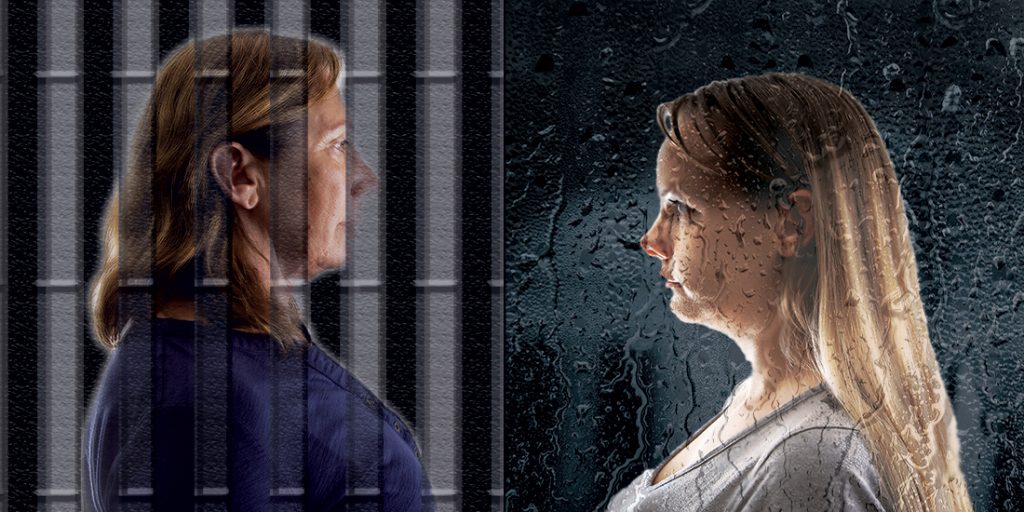
A Moveable Theatre workshops new show with female prisoners
A Moveable Theatre co-founder and actor Julia Johnson’s most memorable moment leading up to the premiere of ‘This Wide Night’ was when the builders working next door to the rehearsal space came over to make sure she and co-star Shardé Anne were alright.
“The domestic must have sounded real to them,” Johnson told Theatre Haus in an interview ahead of opening night this Friday, 19 February, at Fortitude Valley’s BackDock Arts venue.
The two-hander, written by Chloe Moss in 2006 after three months’ volunteering at a UK women’s prison, is billed as a way to “examine choices for women on release from prison” and was workshopped here in Brisbane.
‘This Wide Night’ explores the relationship between two previously imprisoned women, Lorraine (Johnson) and Marie (Anne). Upon release, Lorraine heads directly to Marie’s bedsit, where they attempt to rebuild the friendship they once had while attempting to move on with their lives.
Johnson says a scene was taken to some of the women in the Helana Jones Correctional Centre who are in programs to prepare them for release, as well as some who were recently released.
“We took the play in there because we wanted to see if our characters were authentic enough,” Johnson explained. “We got great feedback from them and took away a lot of their ideas to apply to our characters.”
The scene was also performed for support workers of women serving a sentence, like Amy CK (last name abbreviated for confidentiality purposes), who was featured in an interview on the theatre company’s Facebook page.
“Women in for fraud; they can’t borrow money, hold credit cards, be in positions of trust around money, so that creates issues [for re-entry into society],” CK says. “Even women who’ve had good jobs, with qualifications…they are no longer allowed to work in those areas. For other women…they’re doing menial jobs, but that doesn’t mean they’re not intelligent.”
Criminalised women are a demographic not generally considered in depth by the average person; Johnson said as she learned more. What surprised her the most was her favourite line in the play.
“My character, Lorraine, says, ‘12 years inside and I’m still not free; not properly.’ She has nowhere to live, she was in a hostel for a short time; she can’t get a job, she has no skills… nothing on her horizon. What she’d ideally love to do is rebuild her family, which–I can’t tell you what happens.”
The characters of Lorraine and Marie are based on an amalgamation of different women within the UK prison rather than specific people. As part of their research, Johnson sat and chatted with the Brisbane women at Helana Jones to get an idea of their own experiences.
“We made notes on things they felt and they said…They just relaxed and started telling us all these things they were feeling at the time.”
Those things included:
“I can’t go where I was due to associations”
“I would not go to family or friends as there is too much judgement and burnt bridges”
“I don’t want to live feeling like I could be kicked out at any time”
Johnson said one of the quotes that resonated with her was: “The more times you go in or the longer you’re in there, the smaller your circle becomes on the outside.”
The 40 per cent recidivism in the Australian prison system may seem high, considering the Guiding Principles for Corrections in Australia focus on “rehabilitation and reintegration” with main objectives to “reduce reoffending and provide for successful reintegration back into the community” as described by such jurisdictions as the SA Department of Corrections.
There are 11 high-security and six low-security correctional centres run by Queensland Corrective Services (QSC) across the state. QSC says their aim is to ensure that “prisoners and offenders are provided with appropriate classification, supervision and access to programs, education and vocational training to maximise their chance of successful reintegration into society.”
Johnson is not interested in criticising the system, and recognises the hard work underway, including MARA’s sero4 project, which she calls a “benchmark program starting to address the issues for the women’s release system.”
Her goal is to build awareness.
“These two women are just trying to find their way back into society, and if society can help in any way, or just see what their plight is, I think would be a good start,” she explains. “I think the fact that they’ve paid their dues; they shouldn’t be defined by their crimes.”
A Moveable Theatre was founded by Johnson and Terry Hansen in 1990 when they started performing adaptations of classical and children’s works, as well as social justice theatre.
‘This Wide Night’ signals a re-launch for the pair.
“We were Sydney-based then we moved to Brisbane…A Moveable Theatre was put on hold for 15 years and when we saw this project, we just went, ‘This is what A Moveable Theatre do’,” Johnson said.
Their previous show, ‘Conquest of the South Pole,’ was a play about long-term unemployment across Australia, which earned the company grant funding from the Australia Council that allowed them to start the group.
So what’s next on the docket after ‘This Wide Night’?
“We were looking at some French love stories, but we’ll wait and see,” Johnson laughed.
‘This Wide Night’ runs from a preview night Thursday, 18 February to Sunday, 7 March at BackDock Arts in Fortitude Valley. It is suitable for ages 16+ (with what Johnson describes as “prison-strength language”) and runs approximately 90 minutes.
To purchase tickets and learn more about ‘This Wide Night’, visit A Moveable Theatre’s website.






